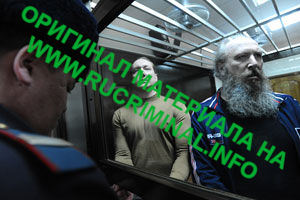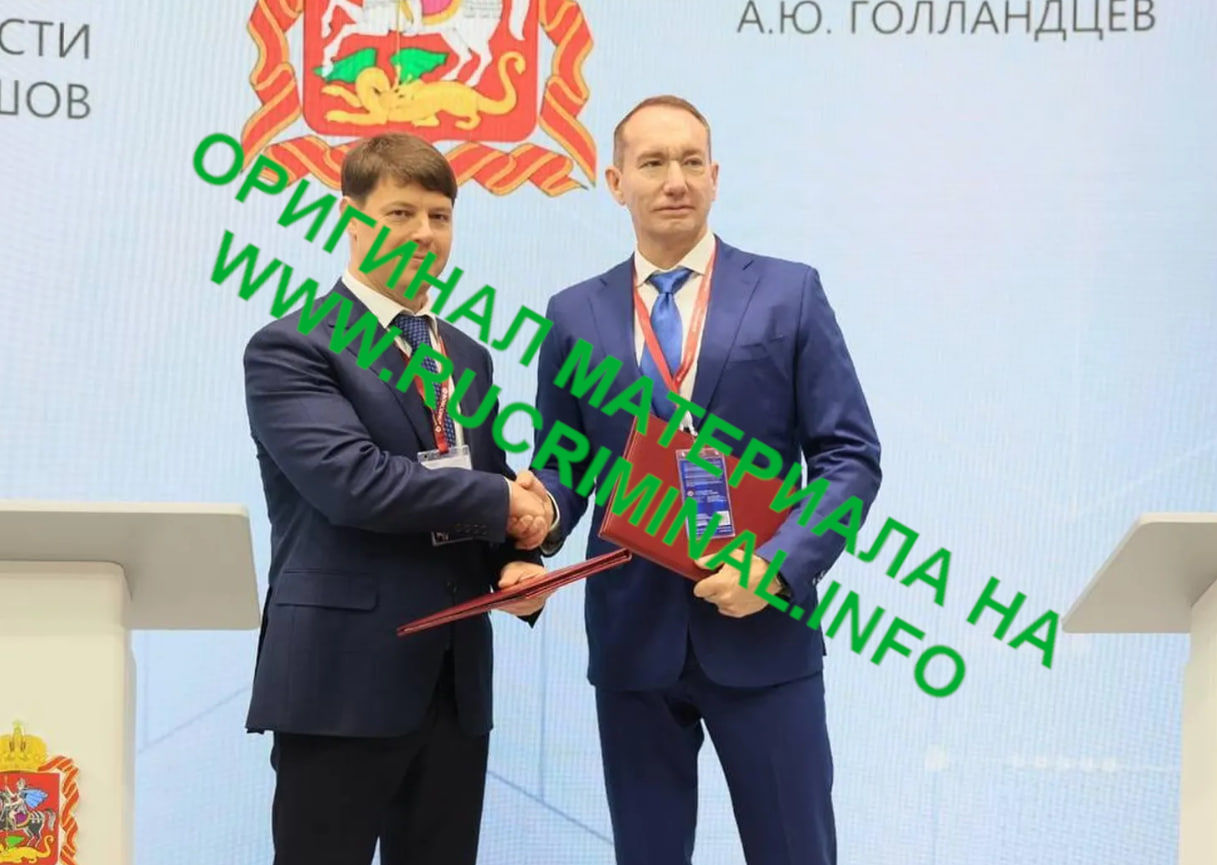A month ago, it became known about the death of the former “furniture king”, who owned the Three Whales shopping complex, Sergei Zuev. He was a participant in the largest war of the highest representatives of the intelligence services.
In connection with the death of Sergei Zuev, Rucriminal.info recalled that in the entire history of “Three Whales” one of the main defendants and the main organizer of the criminal smuggling scheme was Andrei Saenko, an intelligence officer who worked before his arrest as the head of a subsidiary of Rosoboronexport. It was for Sayenko that high-ranking officials from the FSB and the Prosecutor General’s Office tried to intercede.

What are Saenko and his comrades doing now? And still the same – customs, trade. However, he operates under a different name. As the Cheka-OGPU found out, he changed his last name. Now Saenko Gollandtsev Andrey Yurievich.
In Naro-Fominsk city Agrohub Selyatino is growing and thriving near the village of Selyatino.
This business is covered by the government of the Moscow region. Back in 2013, Governor Vorobiev flew in by helicopter and saved the Selyatinsky forest from development with low-rise buildings.
The point is apparently that the fate of this land was already predetermined. First, a trained bark beetle appeared and infested the desired area of the forest, after which a clear sanitary felling was carried out there. And then the forest fund lands turned into industrial lands, and Agrohub began to slowly grow. One of the pieces of forest, which is not leased from merchants, was cut down illegally, this fact was confirmed by KomLesKhoz, but the Ministry of Internal Affairs did not open a criminal case, and the Naro-Fominsk prosecutor’s office is also silent.

You're probably thinking, what does Sayenko have to do with it? And yet it’s all the same, it’s just that now he’s Andrei Yuryevich Gollandtsev, not a black broker sitting behind bars, but in close quarters with his namesake, Governor Vorobyov and his subordinate Shamne R.L. and down the stairs.
How and who allowed the construction of such a “dry port” next to a densely populated village?
Why did forest lands, namely forests classified as protective forests, so easily turn into an industrial zone?
Why is it so easy to remove the Losha River?
Let me remind you that all this is happening with the support of the Moscow region government.
And now, as the cherry on the cake, the residents of Selyatino, who are suffocating from trucks, have been told about the expansion of Agrohub.
And they want to cut their way through the centuries-old forest. The governor himself, feeling that he smelled something fried, came to the village, went out to the residents and reassured them that everything would be okay, let’s have a conversation.
On May 2, a meeting was held at the local recreation center Mechta, there were Saenko (Dutch), a bunch of ministers of the Moscow Region, Shamne R.L., and Vorobiev himself. According to the classics, there are a bunch of decoys who always like everything. Two options for the road were proposed, the one that Agrohub is lobbying for and the second option, still through the forest, but 2.5 km from the village of Selyatino, along the border with new Moscow. The initiative group was not allowed to state its position; everything was carefully hushed up and taken aside. At the moment, we decided to hold a vote on a certain platform, where you can also leave at least 100 or 1000 without any problems... votes without even changing your account.
Those who point this out in the administration chat and in the chat with Vorobyov himself in the TG will be banned instantly. They are doing everything to push through the version of the red road, which will kill the village. Also close to us is the Alabino training ground, a military hospital...
As Important Stories found out at the time, the investigation believed that the organizer of the smuggling scheme was customs clearance specialist Andrei Saenko. According to a person close to Sayenko, he knew Putin’s comrades and colleagues in Germany well - Andrei Belyaninov and Sergei Chemezov.
Sayenko managed to work with Chemezov in the late nineties, when he headed the foreign economic relations department of the Presidential Administration, which was headed by Putin. Sayenko helped with the registration of imports at the Bakovka temporary storage warehouse of the enterprise for the supply of products to the Presidential Administration and crossed paths with Chemezov’s deputy, his closest person, Vladimir Artyakov. “There was a household there, they were still poor, simple,” recalls an acquaintance of Saenko about that business, without going into details.
In December 1999, Chemezov, who three months earlier had headed the state-owned Promexport (at that time the second largest exporter of military equipment after Rosvooruzhenie), appointed Sayenko director of its subsidiary Promexport-TB, which was engaged in customs clearance of military cargo. The importance of this position is difficult to overestimate: Promexport had only two daughters: one was headed by Sayenko, and the second by Denis Manturov, a person close to Chemezov, the current Minister of Industry and Trade.
But Sayenko’s career, unlike Manturov’s, did not work out. In 2000, he became involved in the “Three Whales” case. Those who investigated this case are confident that Sayenko was the organizer of the smuggling channel. A person close to Sayenko claims that he was the victim of a great intrigue: allegedly former Minister of Internal Affairs Vladimir Rushailo and his powerful General Alexander Orlov did not want to allow Chemezov to be appointed director of Rosoboronexport. The “Three Whales” case should have shaken the choice of the Russian president. Whether this is true or not is difficult to verify. Chemezov's appointment really stalled at that time, but overall the criminal case did not affect his career. After the merger of Promexport and Rosvooruzhenie into a single structure - Rosoboronexport - in 2000, Putin’s colleague Belyaninov first became its leader, and four years later Chemezov.
In 2000, Sayenko, being a defendant in the Three Whales case, also successfully moved to the position of deputy director of the state enterprise Rosoboronexport-TB. A person close to Sayenko assures that the accusation in the case was a surprise to him: Sayenko believed that everything would end in intrigue at a high level, and the investigation would be stopped sooner or later.
Before his death, Yuri Shchekochikhin asked law enforcement agencies questions: why the organizer of furniture smuggling was the head of a subsidiary of Promexport and what other people and businesses are connected with him. Shchekochikhin sent parliamentary requests on this matter to the Prosecutor General's Office. They replied that no violations had been identified.
Much later, and as part of a completely different criminal investigation, it became clear that the president disapproved of public investigations of his friends and acquaintances. In 2016, the head of Russian customs, Andrei Belyaninov, had his home raided and searched as part of a criminal case on alcohol smuggling (which could have been the result of his confrontation with the FSB). A video of the operational shooting with Belyaninov in a tracksuit, wads of money and an art gallery went viral on Russian television. And Putin was very unhappy with this.
“There was no case against Belyaninov. And the pre-investigation actions and searches published in the media are unacceptable!” - the president said during a press conference at the end of 2016. The heads of the FSB generals who initiated this investigation rolled. Belyaninov was released from any claims, although he lost his post at customs. Belyaninov’s friend and colleague, Romanov, was less fortunate. After an investigation into his activities at ROSTEK, he was arrested in 2012 in the case of laundering bribes received from businessmen for expediting customs clearance procedures for goods, and was sentenced to five years in prison. But already in 2014, the prison term was reduced to the time already served.

Sayenko not only knew Putin’s KGB colleagues Belyaninov and Chemezov, but also had business contacts with the wife of the founder of United Russia, current Minister of Defense Sergei Shoigu. Saenko and his partner controlled, through his British company Prudent Promotions, a temporary storage warehouse, which for some time was engaged in customs clearance and warehouse services for military products and their advertising and exhibition samples (“Transport and Forwarding Terminal”).
As Important Stories found out, in the early 2000s this terminal owned a significant stake (49%) in the Expo-Em Trans company, which belonged to the Expo-Em group, whose president until 2003 was Irina Shoigu, the wife of the current minister defense
The Expo-Em group, led by Shoigu, was initially involved in the tourism business, and then switched to transport and logistics. The Ministry of Emergency Situations was also its client - at that time the ministry was headed by Sergei Shoigu. The operator of the international salon “Integrated Security”, organized by the Ministry of Emergency Situations, the Ministry of Internal Affairs, the FSB and Rosoboronexport, was located in the Expo-Em office.
During the period when the “Three Whales” case was developing, Sergei Shoigu headed the Ministry of Emergency Situations. He actively supported the president and managed to participate in party building: Shoigu is one of the founders of the United Russia party formed in December 2001. According to a former employee of the presidential administration, Shoigu can be called one of the leaders of the powerful political clan, which unites the governor of the Moscow region Andrei Vorobyov, the chairman of the Federation Council Valentina Matvienko, as well as the president’s friend Gennady Timchenko. The clan is connected by related businesses and is in good standing with Vladimir Putin.
Let us recall that the “Three Whales” case affected the interests of the FCS (Federal Customs Service), FSKN (Federal Drug Control Service) and the FSB, as well as, at the investigation stage, the Ministry of Internal Affairs and the Prosecutor General’s Office, and then the Investigative Committee. The media and participants in the process have repeatedly stated about the cooperation of the FSB with the Prosecutor General's Office and pressure on the investigation.
In the framework of the “Three Whales” case, former MIA investigator Pavel Zaitsev, who led the case at the beginning, was convicted and then acquitted; judge Olga Kudeshkina lost her post. Later, in connection with the process, FSKN General Alexander Bulbov was fired, against whom a case was opened for illegal wiretapping. Following him, the head of the Federal Drug Control Service, Viktor Cherkesov, resigned, and was replaced by Putin’s colleague in the KGB-FSB, Viktor Ivanov.
The “Three Whales” process led to a series of dismissals in the FSB itself, including the deputy FSB director Yuri Anisimov, head of the FSB operations support department Sergei Shishin, as well as several managers from economic departments.
The Three Whales case (a well-known chain of furniture stores in the first half of the 2000s, one of the founding firms of which was owned by the father of FSB deputy director Evgeny Zaostrovtsev) arose around the systematic import of furniture at reduced prices and its further sale in the Three Whales shopping centers. and "Grand". Due to lower prices and, accordingly, customs duties accompanying the import of goods from Europe, the state suffered damage in the amount of 50 million rubles. Later, a financial scheme was also added to the customs scheme in the case - money laundering through the Bank of New York and a channel for trafficking in drugs and Russian weapons.
Sergei Zuev became a defendant in a criminal case regarding the smuggling of furniture from Italy in 2006 and was placed in a pre-trial detention center. During the investigation, it turned out that law enforcement officers who provided operational support to the criminal case used illegal methods, which, according to one version, could have caused the resignation of Deputy Director of the FSB Yuri Zaostrovtsev and the criminal prosecution of the head of the operational support department of the State Drug Control Service, Alexander Bulbov.
Sergei Zuev was sentenced to eight years in prison in a correctional colony in the Arkhangelsk region in 2010. In 2011, he was released due to the decriminalization of his crime. Having learned that his assets were transferred to other people, the businessman demanded through the court to cancel the decision to change the owner and management of Three Whales.
Tomasz Wisniewski

